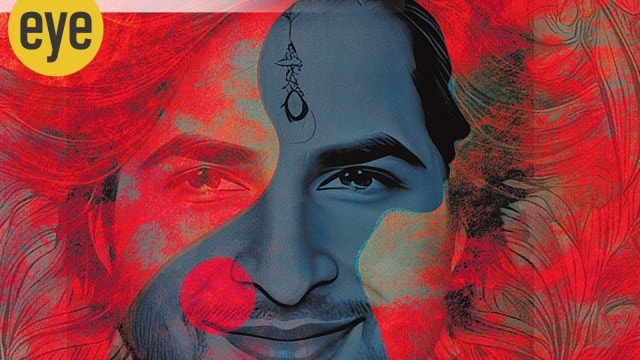From grandma’s kitchen: A recipe for life
The more I lived, the more I saw that meaning was made in the margins. Not in the limelight, but in the lingering.
 She taught me everything I know about timing—not the timing of to-do lists or calendar reminders, but the tempo of trust, the pace of patience, the lull before the sizzle. (Credit: Suvir Saran)
She taught me everything I know about timing—not the timing of to-do lists or calendar reminders, but the tempo of trust, the pace of patience, the lull before the sizzle. (Credit: Suvir Saran)The law is reason-free from passion, said Aristotle, and perhaps in courts and codes, in clauses and contracts, that may be true. But life, real life, isn’t lived in logic. Life is lawless, lush, lyrical. It is not sculpted by syllogism, but sung in the shrill, sweet, startling song of the heart. It is not governed by gavel and verdict, but by the vagaries of memory, the weight of a glance, the warmth of a word whispered at the right moment—or the wrong one. Passion, not reason, is the pulse of living. Love, not logic, is the fire that forges us.
I have found this not in philosophy’s pages, but in the kitchen, in conversations, in the quiet chaos of ordinary days. Life reveals itself not through conclusions but through chutneys and chattels, through laughter laced with longing, through the smell of ghee rising from a hot paratha, through the tired thump of feet finding rest at dusk. Some of my deepest truths arrived unannounced, like mangoes in May—golden, ripe, rich with memory. They came softly, like the smell of sandalwood curling through a summer courtyard, like my grandmother’s hands rubbing mustard into mangoes for pickles that would outlast the season and carry stories in their salt.
She taught me everything I know about timing—not the timing of to-do lists or calendar reminders, but the tempo of trust, the pace of patience, the lull before the sizzle. In her hands, recipes were rituals, and rituals were revelations. Her food wasn’t about flair; it was about feeling. It was about listening—to the lentils, to the silence, to the soul. Her roti puffed not from perfection, but from presence. She taught me to wait, to watch, to wonder. That the dough must rest before it can rise. That the dal must bubble before it can bloom. That the heart, too, must be held—gently, generously, and often in silence.
And yet the world we live in rarely honours that silence. It rushes. It races. It demands deliverables, not devotion. It celebrates speed over stillness. In the world outside my grandmother’s kitchen, people sharpened their sentences and trimmed their tenderness. They advised ambition, not affection. They spoke of professionalism as if it were purer than passion. They said: don’t take it personally. But what else is there to take personally, if not life? A half-eaten meal. A missed call. A forgotten birthday. A friend who moves on without mourning. A city that swallows you without a second glance. The small slights that settle like dust in your chest and make you ache quietly.
We are taught to toughen. To harden. To grow up. To not feel too much. But when did numbness become noble? When did detachment become a discipline? We learn to hide our hunger. We silence our softness. We wrap our yearning in routines. We pretend we don’t need to be seen, to be soothed, to be held. But we do. Even the strongest among us do. Especially the strongest.
There was a time when I thought success was measured in the magnitude of moments—in the awards, the applause, the adrenaline of achievement. But the more I lived, the more I saw that meaning was made in the margins. Not in the limelight, but in the lingering. In the way someone pours you chai without asking. In the way you hum a tune while chopping coriander. In the way a dog waits by the door even when you’re late. In the way sunlight slices through a curtain and lands on the same spot of your dining table day after day, faithful and forgotten. These are the small things that stitch us together. The simple things that save us.
I have sat in fancy rooms. I have spoken on big stages. I have fed strangers in cities I can’t remember. But nothing has moved me more than the way my mother would fold my shirt sleeves before a journey. Or how my father, rarely vocal, once left me a note with a single line: “Come home when you’re tired.” There was more warmth in that sentence than in a thousand congratulatory claps. More healing in its hush than in all the hurried happiness the world waves in your face.
Fulfillment is not a frenzy. It is not fame. It is not followers. It is that fleeting yet full feeling of fitting in your own skin. It is peace in the pantry. Joy in the jhaadu. Grace in the grind. It is in growing a tulsi plant and watching it wilt and watering it anyway. It is in giving without guarantees, in working without applause, in loving without insurance. It is in chopping onions and not minding the tears. It is in waking up and walking to the kitchen and making tea even when your heart is heavy.
I’ve learned that living well is not about getting ahead, but about going deeper. Digging into the day like you would into a bowl of biryani—knowing there are layers. Saffron and secrets. Spice and sorrow. Softness under the surface. You cannot skim through it. You have to sit with it. Stir it. Stay.
To live deeply is to refuse the shallows. It is to risk ruin for the sake of realness. It is to love with your whole heart, knowing it may break. It is to show up—tired, trembling, tender—and still offer your best. Not because the world deserves it, but because you do. Because giving is its own grace. Because effort is sacred. Because sincerity is strength.
And yet we forget. We fall for the filtered life. The curated calm. The illusion of invincibility. But real life is rarely photogenic. Real life is messy. It is bhindi that burns. It is shirts stained with sambhar. It is missing someone who may never come back. It is forgiving someone who never said sorry. It is choosing to stay when leaving would be easier. It is fighting with someone and still making their favourite aloo for dinner. It is holding space even when your own feels hollow.
It is not easy. But it is everything.
Because love, not law, is what lifts us. Not the love in songs or stories, but the everyday kind. The workday kind. The Wednesday evening kind. The love that looks like making a to-do list for someone else. Like checking if the geyser’s on. Like leaving the last piece of cake. Like noticing. Like remembering. Like trying, again and again, even when you’re tired.
And so, I no longer chase meaning in the marquee. I find it in the mundane. In the unspoken. In the unsaid. I find it in the crackle of curry leaves. In the way rice rises when rinsed. In the comfort of a cracked cup that still holds chai. In the resilience of a heart that’s been hurt but still hurries to help.
Maybe that’s what living is. Not grand gestures, but grounded grace. Not perfect planning, but presence. Not always winning, but always wondering. Maybe we are here not to be remarkable, but to be real. To be raw. To be receptive.
Because in the end, what remains? Not the riches. Not the resumes. Not the rational. But the rhythms we shared.



- 01
- 02
- 03
- 04
- 05




























